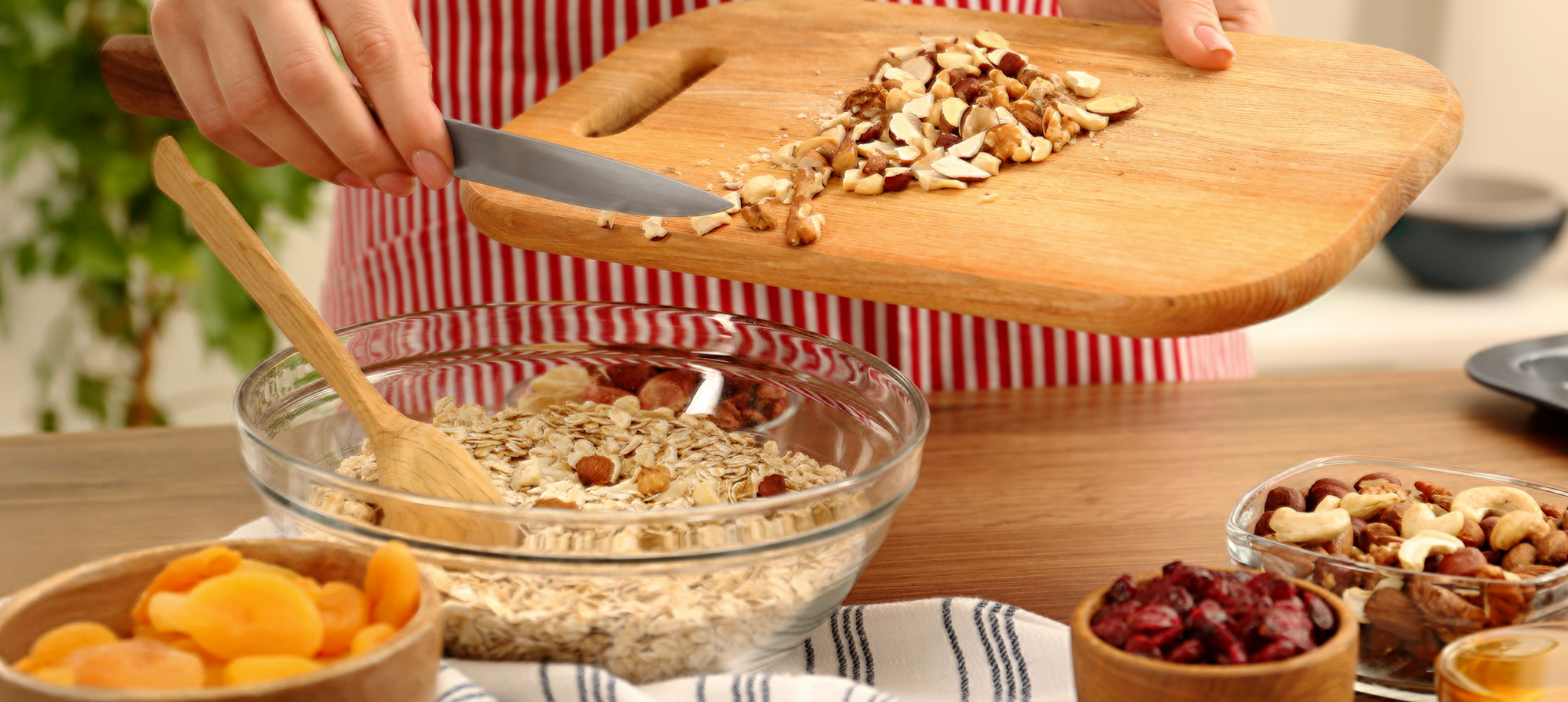Whether or not to eat breakfast is an age-old question. But the health reasons for eating the first meal of the day may outweigh the reasons for passing it up.
You’re sitting on your deck admiring the morning sun or at your kitchen table, slowly taking in the day. A steaming cup of coffee or tea sits before you, and you drink in the moment. You don’t feel very hungry and haven’t even considered your options for breakfast. In fact, you may skip breakfast altogether. You had a big dinner and you’re simply not hungry.
Does this sound like a typical morning to you? Many of us might be ready to eat breakfast first thing in the morning, while others may begin the day in a more leisurely manner. But however you start your day, studies suggest that breakfast may be one of the most important meals of the day. Skipping it, on the other hand, may rob you of some of the vital nutrients that can power your day.
Pace yourself
You may not be a breakfast person. If that’s the case, focus instead on what you eat over the course of the day. But keep in mind, when you wake up, you haven’t eaten for 7 to 12 hours, or possibly longer. Your energy is likely used up, and your body probably needs to refuel.
Eating breakfast can boost your energy levels and restore the vital nutrients and minerals that were depleted during the night.
How many people eat breakfast?
It turns out that a lot of people eat breakfast. The Centers for Disease Control and Prevention (CDC) reported that, from 2015 to 2018, 86.4 percent of American adults aged 40 to 49 years ate breakfast. Of adults 60 years or older, 91.6 percent ate breakfast . And women tended to outpace men as regular breakfast eaters.
Studies suggest that breakfast sets you up with more energy over the course of the day. It also promotes better health. According to one study, those who didn’t eat breakfast missed out on vital nutrients and vitamins and had an overall lower-quality diet. They ate more added sugar, total fat, and carbohydrates.
So, eating breakfast can give you rich health benefits, both now and for the future.
Why is breakfast the most important meal of the day?
Here are 7 reasons why you'll want to eat breakfast—and some healthy foods to include in that first meal of the day. Then read on for some recipes that can broaden your breakfast repertoire.
Eating breakfast each day may help:
1. Steady your blood sugar levels. While you sleep, when you aren’t eating, your liver breaks down glycogen (from food) and releases it into your bloodstream as glucose to keep your blood sugar levels stable.In the morning, after you have gone without food for as long as 12 hours, your glycogen is low. That means less glucose is released into your blood stream, and so less of it is available for your cells to use for energy. Once all the energy from these stores is used up, your body starts to break down fatty acids to create the energy it needs, and this process lowers your energy level.
Eating breakfast restores your glycogen levels, thereby boosting your energy and keeping your metabolism humming along throughout the day.
2. Give your body the nutrients it needs. Many breakfast foods are teeming with nutrients, including fiber, iron, vitamin B, calcium, and folate. People who eat breakfast are more likely to meet their recommended daily intakes of these and other vitamins and minerals. And although your body may have enough energy to make it to lunch, it’s wise to top it off with vitamins and minerals at the start of the day to stay at your healthiest.
Another good reason to eat breakfast? If you take any medications, some of them may need to be taken with food. This helps you avoid an upset stomach. So, you can get into the routine of taking your daily medications first thing in the morning, if you don’t skip breakfast.
3. Protect your heart health. Eating breakfast may help support your heart health and lower the risk of heart disease. How does breakfast do that? It’s a great time to choose high-fiber carbs—like whole grain breakfast cereals. Getting 25 grams or more of daily fiber can help keep your cholesterol at healthy levels. Some findings also suggest that people who regularly skip breakfast may be at a higher risk of cardiovascular disease.
4. Sustain your brain power. It’s 10 a.m., and you didn’t eat breakfast. You can’t focus and you feel sluggish. When you don’t eat breakfast, your brain may not have the energy it needs to get—or keep—going. Studies suggest that not having breakfast affects your mental performance. This includes your attention, concentration, and memory.

5. Help you control your weight. It is thought that eating breakfast may help you control your weight because it prevents large fluctuations in your blood sugar levels throughout the day. Steady blood sugar in turn helps to control your appetite. Breakfast fills you up before you become hungry, so you may be less likely to snack on whatever foods are nearby when hunger strikes later in the day (think high-calorie, high-fat foods with added sugar or salt).
6. Lessen your risk of illness. Those who eat breakfast on a routine basis tend to have a lower risk of obesity. Obesity can raise the risk for health problems such as type 2 diabetes and heart disease. In fact, studies suggest that people who skipped breakfast 4 or 5 days a week had a higher risk of type 2 diabetes. Skipping breakfast is also thought to raise the risk for high blood pressure.
Conversely, studies suggest that routine breakfast eaters tend to have healthier eating habits.
7. Support your mental health. Although more research is needed, some studies suggest that eating breakfast may help ward off stress and depression. One study found that skipping breakfast was linked with poor mental health. One reason why may be that skipping breakfast leads to low blood sugar, which can cause irritability and tiredness.
 What foods should you eat at breakfast?
What foods should you eat at breakfast?
You may be asking yourself, what are some of the best breakfast foods to eat? Planning a variety of menus can help you look forward to eating tasty (and healthy) foods at breakfast. For example, try a veggie omelet with a side of fruit, along with whole grain toast or yogurt (without added sugar). Or perhaps you’d rather have a smoothie with spinach, fruit, and yogurt—especially if you’re short on time.
If your breakfast includes a choice of foods that are rich in calcium and vitamin D—like egg yolks, fortified juice or milk, or whole grain cereals—you’ll help support your bone health in the bargain.
There are endless combinations of healthy foods that provide the energy you need to keep you fueled throughout the day. 
2 healthy breakfast recipes you’ll love
You’ll be less likely to skip breakfast if you plan for tasty, healthy fare. You don’t have to load up on greasy bacon and sausage or sugary pastries to make your morning meal appealing. Check out the recipes below and give one or two of them a try.
Oatmeal
This simple recipe is brimming with nutrients like vitamin C, fiber, vitamin K, manganese, and antioxidants. It’s also high in omega-3 fatty acids—polyunsaturated fats that help your body function in many ways. And it makes for a tasty bowl of comfort.
Ingredients
- ½ cup unflavored oats (preferably rolled or “old fashioned”)
- ½ cup water, milk (low-fat or non-fat preferred), or yogurt of your choice (regular, soy, almond or other)
- ¼ cup chopped strawberries
- ¼ cup blueberries
- 1 Tbsp ground flaxseed or chopped walnuts
- ¼ tsp vanilla
- ¼ tsp cinnamon
Directions
Cook the oats and water, milk, or yogurt in the microwave for 3 minutes or according to the package. Combine the oatmeal with the blueberries and walnuts or flaxseed. Add vanilla and cinnamon.

This recipe can power you through the day. Low in saturated fat and high in dietary fiber, it combines buckwheat and whole wheat flour. These pancakes are hearty and have an interesting flavor, with the added sweetness of fresh blueberries.
Ingredients
Dry mix:
- 2 cups whole wheat flour
- ½ cup buckwheat flour
- 3 Tbsp turbinado sugar
- 1½ tsp baking powder
- 1/8 tsp salt
- 2½ cups low-fat buttermilk
- 1 Tbsp safflower oil
- 2 tsp vanilla extract
- 1 large egg white
- 2 cups blueberries
Directions
To prepare the pancake mix, lightly spoon the flours into dry measuring cups; level with a knife. Stir together the flours, sugar, baking powder, and salt in a large bowl. Store in an airtight container until ready to use.
Combine the buttermilk and remaining ingredients. Slowly stir in dry mix in ¼ cup increments. Stir until smooth.
Spoon about ¼ cup batter for each pancake onto a hot nonstick griddle or nonstick skillet. Turn the pancakes when the tops are covered with bubbles and the edges look covered. Cook for an additional minute. 
Starting your day
After you’ve savored your coffee and the quiet of the morning, you can ponder the age-old debate of whether to eat breakfast or not. Or you can go to the pantry and start rustling up some healthy food to kick start your day the right way. 
Not a Silver&Fit® member? Learn more about everything the program has to offer, including more helpful healthy living tips like this, here on our website.
This information is not intended to take the place of regular medical care or advice. Please check with your doctor before using this information or beginning any self-care program. Images used for this article do not depict any members of the Silver&Fit Program.
References
Ballon, A., Neuenschwander, M., & Schlesinger, S. (2019). Breakfast skipping is associated with increased risk of type 2 diabetes among adults: A systematic review and meta-analysis of prospective cohort studies. The Journal of Nutrition. 149(1), 106–113. https://doi.org/10.1093/jn/nxy194
Centers for Disease Control and Prevention. (2020, December 31). QuickStats: Percentage of adults aged ≥20 years consuming breakfast on a given day, by sex and age - United States, 2015–2018. Centers for Disease Control and Prevention. https://www.cdc.gov/mmwr/volumes/69/wr/mm695152a9.htm#
Cleveland Clinic. (2022, June 29). 5 on-the-go hearty, heart-healthy breakfast ideas. https://health.clevelandclinic.org/5-on-the-go-hearty-heart-healthy-breakfast-ideas/
Cleveland Clinic. (2023, July 11). Do you really need to eat breakfast? https://health.clevelandclinic.org/do-you-really-need-to-eat-breakfast/
Cleveland Clinic. (2023, March 8). Recipe: Breakfast fried rice with scrambled eggs. https://health.clevelandclinic.org/recipe-breakfast-fried-rice-with-scrambled-eggs/
Department of Health & Human Services. (2000, August 9). Breakfast. Better Health Channel. https://www.betterhealth.vic.gov.au/health/healthyliving/breakfast
Fanelli, S., Walls, C., & Taylor, C. (2021, April 30). Skipping breakfast is associated with nutrient gaps and poorer diet quality among adults in the United States: Proceedings of the nutrition society. Cambridge Core. https://doi.org/10.1017/S0029665121000495
Harvard Health. (2021, September 1). Adults who skip morning meal likely to miss out on nutrients. https://www.health.harvard.edu/nutrition/adults-who-skip-morning-meal-likely-to-miss-out-on-nutrients
Harvard Health. (2011, June 1). Breaking the fast. https://www.health.harvard.edu/staying-healthy/breaking-the-fast
Harvard Health. (2014, January 9). Skipping breakfast may increase coronary heart disease risk. https://www.hsph.harvard.edu/news/features/skipping-breakfast-may-increase-coronary-heart-disease-risk/
Harvard Medical School. (n.d.). Sugar and the brain. https://hms.harvard.edu/news-events/publications-archive/brain/sugar-brain#
InnerDrive. (2023, October 19). The 7 psychological benefits of Students Eating Breakfast. https://blog.innerdrive.co.uk/the-7-psychological-benefits-of-students-eating-breakfast
Ofori-Asenso, R., Owen, A. J., Liew, D. (2019). Skipping breakfast and the risk of cardiovascular disease AND DEATH: A systematic review of prospective cohort studies in primary prevention settings. Journal of Cardiovascular Development and Disease. 6(3), 30. https://doi.org/10.3390/jcdd6030030
Rong, S., Snetselaar, L. G., Xu, G., Sun, Y., Liu, B., Wallace, R. B., & Bao, W. (2019). Association of Skipping Breakfast with cardiovascular and all-cause mortality. Journal of the American College of Cardiology. 73(16), 2025–2032. https://doi.org/10.1016/j.jacc.2019.01.065
Young, I. E., Poobalan, A., Steinbeck, K., O’Connor, H. T., & Parker, H. M. (2022). Distribution of energy intake across the day and weight loss: A systematic review and meta‐analysis. Obesity Reviews. 24(3). https://doi.org/10.1111/obr.13537
This article was written by Kimberley Reynolds, edited by Gail Olson, and clinically reviewed by Elizabeth Thompson, MPH, RDN.





